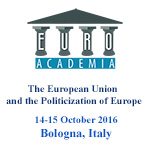Euroacademia Conferences
 Europe Inside-Out: Europe and Europeanness Exposed to Plural Observers (9th Edition) April 24 - 25, 2020
Europe Inside-Out: Europe and Europeanness Exposed to Plural Observers (9th Edition) April 24 - 25, 2020 Identities and Identifications: Politicized Uses of Collective Identities (9th Edition) June 12 - 13, 2020
Identities and Identifications: Politicized Uses of Collective Identities (9th Edition) June 12 - 13, 2020 8th Forum of Critical Studies: Asking Big Questions Again January 24 - 25, 2020
8th Forum of Critical Studies: Asking Big Questions Again January 24 - 25, 2020 Re-Inventing Eastern Europe (7th Edition) December 13 - 14, 2019
Re-Inventing Eastern Europe (7th Edition) December 13 - 14, 2019 The European Union and the Politicization of Europe (8th Edition) October 25 - 26, 2019
The European Union and the Politicization of Europe (8th Edition) October 25 - 26, 2019 Identities and Identifications: Politicized Uses of Collective Identities (8th Edition) June 28 - 29, 2019
Identities and Identifications: Politicized Uses of Collective Identities (8th Edition) June 28 - 29, 2019 The European Union and the Politicization of Europe (7th Edition) January 25 - 26, 2019
The European Union and the Politicization of Europe (7th Edition) January 25 - 26, 2019 7th Forum of Critical Studies: Asking Big Questions Again November 23 - 24, 2018
7th Forum of Critical Studies: Asking Big Questions Again November 23 - 24, 2018 Europe Inside-Out: Europe and Europeanness Exposed to Plural Observers (8th Edition) September 28 - 30, 2018
Europe Inside-Out: Europe and Europeanness Exposed to Plural Observers (8th Edition) September 28 - 30, 2018 Identities and Identifications: Politicized Uses of Collective Identities (7th Edition) June 14 - 15, 2018
Identities and Identifications: Politicized Uses of Collective Identities (7th Edition) June 14 - 15, 2018
Fiscal Consolidation, Shadow Economy and the Sustainability of Private Consumption: Further Evidence from Selected Eurozone Economies
-
-

-
Presentation speakers
- Ioannis Kostakis, Harokopio University, Athens
- Eleni Theodoropoulou, Harokopio University, Athens
Abstract:
According to neoclassical perception the growth of private consumption is higher during (or after) fiscal consolidation periods via the multiplier effect of a government cut. Private consumption booms, therefore are more likely to be associated with large cuts in deficits by either increasing taxes or by reducing transfers. On the other hand, shadow economy and corruption issues have only lately gained economic researchers’ interest showing a negative effect on real economy. This research uses an alternative growth of private consumption approach using dynamic panel data regression analysis of 17 (14 excluding Estonia, Latvia and Lithuania) Eurozone countries and endeavors to shed light on these issues. Empirical findings show that consolidation periods experience a marginal lower private consumption growth, questioning the generality of neoclassical theory implication. Furthermore, as expected, informal economy leads to a higher private consumption, but with a high cost for public economics
-
Related Presentations

The EU’s Changing Discourse in the EU Documents on Civil Society in Turkey
- Alper Yurttas
- Selma Sekercioglu

Bologna’s Iconography. The Representation of the City in the Paintings of Pinacoteca Nazionale
- Denise Tamborrino

Diplomatic Instruments: U.S. Symphony Orchestras And The Cold War
- Jonathan Rosenberg

Europe and the Last 30 years – Consequences of Abandoning Qualitative Distinctions
- Gerhard Eichweber













